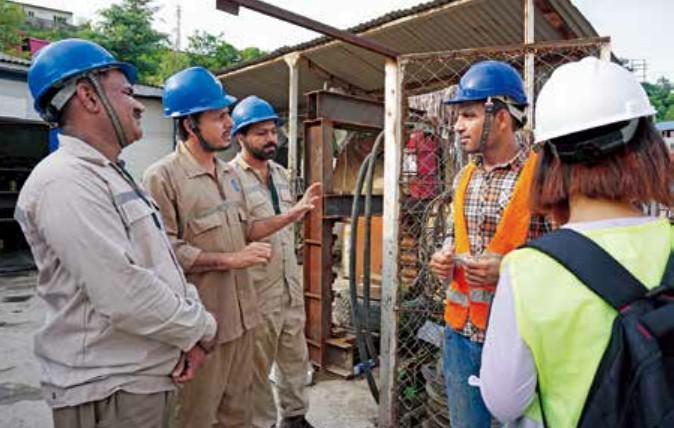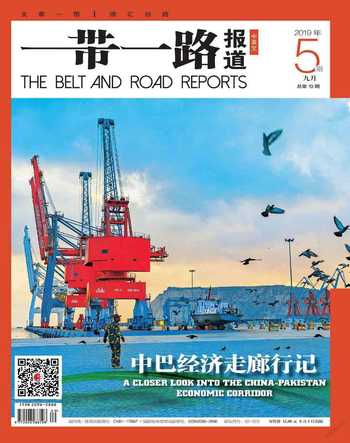当“你好”成为通用语
彭纳
提到“巴铁”一词,每个国人都不会感到陌生,那些关于两国友好交往的点滴仿佛早已留存在记忆里。而今天,当我们踏上巴基斯坦的国土,“巴铁”这个词终于从口口相传的故事变得鲜活生动起来。
在巴基斯坦的半个月,数不清有多少人用中文“你好”向我们打招呼,“中国和巴基斯坦之间的友谊源远流长”是我们来到这里后最常听到的一句话。那些在巴基斯坦小学课本里所描述的中国,如今,也在中巴经济走廊的建设中变得立体起来。
在这个时代,两个古老的国度因一个伟大工程变得愈加紧密,来自不同背景、不同文化的年轻人,正通过学习彼此的语言而愈加了解对方,并追寻自己人生的新方向。
在距离伊斯兰堡180多公里的白沙瓦市,穿着一袭白色长袍的慕德已经等候我们多时,一打照面,这个年轻的小伙儿便用流利的中文跟每一个人打招呼,“你好,我叫慕德,羡慕的慕,美德的德。”
4年前,慕德还一句中文都不会讲,刚刚大学毕业的他在白沙瓦工作时渐渐发现,成批的中国人走进了白沙瓦。“我很想跟他们交流沟通,但一筹莫展、一窍不通。”总靠手势交流也不是办法,于是,这个小伙儿萌生了学中文的念头。
最初,慕德靠着网络自学,“太难啦,中文是全世界最难学的语言。”自学了一段时间后,慕德发现想要学好中文,必须系统学习。于是在2015年,他毅然决然地离开了家乡白沙瓦,来到首都伊斯兰堡从头开始学,这一次,他真正地走进了中文的世界。
学习期间,慕德偶然得知了一个可以去中国留学的消息,通过笔试、面试,他最终拿到了奖学金,顺利考入了四川大学。“这个考试很难,很严格的。”说到那次改变他人生方向的考试,慕德有点骄傲地强调,“招考是面向全巴基斯坦的,参加考试的人数很多,白沙瓦就录取了我一个人呢!”
第一次到中国的慕德还闹了不少“笑话”。出国前,慕德认为每个中国人都应该会功夫;而四川作为中国国宝大熊猫的故乡,应该家家户户都有一只熊猫。“我还想跟熊猫亲近亲近,结果到了四川才知道,原来不是每个四川家庭都有熊猫。”虽然想象与现实有些不同,慕德笑了笑告诉记者,后来,他还是问道青城山,在那里学习了太极拳,圆了“功夫梦”。
三年半的学习很快结束,操着一口流利中文的慕德选择回到他的家乡,“回巴基斯坦,是想通过自己,为中国和巴基斯坦搭建沟通的桥梁。”白沙瓦是个很美的地方,慕德希望未来,他能讲好白沙瓦的故事,让更多的中国游客到家乡旅游,“另外,我还想办一个中文学习班。”近些年,慕德身边越来越多的人想要学习中文,想到中国留学,而这种现象绝不仅仅只在白沙瓦出现。

据教育部数据显示,2018年巴基斯坦来华留学生人数达到28023人,在来华留学国别排序中位居第三位。这些巴基斯坦留学生中,有专门为学习语言而来,也有为了学习别的专业知识而来,萨米就是其中之一。
在中国水电七局的项目地上,踩着机械轰鸣声匆匆赶来的萨米,是项目地不可或缺的“宝贝”,会说乌尔都语和中文的他,是中巴双方员工交流的纽带。个头高高的他,穿着标准“理工男”的格子衬衫、牛仔裤,一打听才知道,这个从土木工程毕业的帅小伙是如假包换“made in China”的理工男。
2013年刚到中国的萨米连“你好”都不会说,“当时觉得中文太难,有点畏难情绪,不想学。”但要在中国生活学习,不会中文寸步难行,于是萨米一头扎进了中文的学习。光报补习班还不够,课后他还一笔一画地练习写汉字,现在,他的汉语词汇量已经2000多了,“我还有个小目标,几年后,词汇量要达到5000。”
掌握了中文后,萨米顺利地考取了武汉海事职业学院的土木工程专业,毕业后,他顺利应聘到水电七局项目部工作,“虽然现在我做的是翻译工作,但在未来,我希望自己能够成为一名工程师。”
在萨米的规划中,他还想到中国进修土木工程的硕士。“这也是我爸爸的愿望。”萨米很早就没了母亲,父亲带着他们兄弟6人,即使生活条件并不富足,但父亲在他们兄弟读书的问题上却立场坚定,“我们从小就知道中巴友谊深厚,如今又有很多中国企业到巴基斯坦搞建设,所以爸爸很支持我到中国来学习。”如今,萨米的弟弟在爸爸的鼓励下,也拿到了中国一所大学的录取通知书。未来,在中巴经济走廊的项目地上,将会看到兄弟俩一起建设祖国的身影。
Chinese people are very familiar with the phrase“Iron friendship with Pakistan” as memories of the fond China-Pakistan friendship have long been carved into our minds. Today, as we step onto the land of Pakistan, the phrase is getting more vivid.
During the half month stay in Pakistan, numerous people saluted us with “nihao”. The most common sentence we have heard was “China and Pakistan enjoy a long-standing friendship”. The image of China described in the primary school textbooks of Pakistan is becoming more three-dimensional amid the development of China-Pakistan Corridor.
In this age, two ancient states are being linked closer together thanks to a great project. Young people of different backgrounds and cultures are getting to know each other by learning the language, seeking for new life courses.
In Peshawar, some 180km away from Islamabad, white coat-clad Mude had waited us for quite a while.Seeing us, the young man greeted us with fluent Chinese, “How do you do? My Chinese name is Mude. It’s a name made up by Chinese characters meaning‘admiration’ and ‘virtue’ respectively.”
Four years ago, Mude cannot speak a word of Chinese. As a fresh college graduate, he worked in Peshawar, where he found Chinese people streamed in. “I wanted to talk with them, but it did not work.”Gesture did not work, either. Then the young boy had the idea of learning Chinese.
At first, Mude studied on his own with internet, “It is too difficult. Chinese is the most difficult language in the world.” After a period of self-study, he realized that he had to study systematically to master the language. In 2015, he left his hometown Peshawar for Islamabad, where he started from scratch and then entered the world of Chinese language.
During that period, Mude chanced to hear a news of studying in China. He passed written examination and interview, got the scholarship, and entered Sichuan University. “That examination was very hard and rigorous.” Talking about the life-changing examination, Mude stressed proudly, “Anyone of Pakistan can apply for it, and many people participated in it. I was the only one enrolled in Peshawar.”
As a newcomer, Mude made many funny mistakes in China. Before leaving Pakistan, he thought that every Chinese people can play kung fu; and in Sichuan, the hometown of panda, each household has a panda. “I wanted to have a close contact with panda. It was till when I arrived in Sichuan that I knew that not every Sichuan household have a panda.” Then he realized the gap between his imagination and the reality. He smiled and told the reporter, later he visited Qingcheng Mountain, where he learned Tai Chi to realize his “kung fu dream”.
When the 3.5 years of study finished, Mude, who spoke fluent Chinese, returned to his hometown,“I want to return to Pakistan to build a bridge of communication between China and Pakistan.”Peshawar is a nice place. Mude hopes to tell the stories of Peshawar in a better way, and bring more Chinese tourists to Peshawar, “I also want to open a Chinese language training course.” In recent years, around Mude, a growing number of people want to learn Chinese and study in China. In fact, it is a phenomenon which can be found in Peshawar and beyond.
According to data from the Ministry of Education, the number of Pakistani students studying in China reached 28,023 in 2018, ranking third among all countries. And Sami was one of those Pakistani students who came to China to learn Chinese or specialized knowledge.
The reporter saw Sami at the project site contracted by Sinohydro Bureau 7 Co., Ltd. amid the hum of mechanical equipment. Speaking Urdu and Chinese, Sami plays an indispensable role in bridging Chinese and Pakistani employees. The young man looks tall and wears plaid shirt and jeans just like a“science geek”. This handsome guy majoring civil engineering is a graduate “Made in China”.
In 2013, when Sami just arrived in China, he could not even speak “Nihao (hello)”. “It’s too hard to learn Chinese. I gave up.” However, Sami found it is extremely inconvenient to live and study in China as he could not speak Chinese, and thus he began to work hard on Chinese. Sami went to tutoring classes and practice writing Chinese characters hard after classes. So far, his has acquired more than 2,000 Chinese vocabularies. “I set a goal for myself, that is, to master 5,000 Chinese vocabularies a few years later,” said Sami.
After acquiring Chinese, Sami successfully enrolled in the civil engineering major of Wuhan Maritime Vocational College. When graduating from the college, he was hired by the project department of Sinohydro Bureau 7 Co., Ltd..“Although I am doing translation now, I hope I can become an engineer in the future.”
Sami also hopes to pursue a master’s degree in civil engineering in China. “That’s what my father wants, too.” In fact, Sami is from a one-parent family, and his father raises six children alone. Even if the family is not rich, Sami’s father supports the education of the six children. “We have known since childhood that China and Pakistan are intimate friends, and now many Chinese enterprises are engaged in construction in Pakistan, so my father supports me to come to China to study.” Now one of Sami’s younger brothers, encouraged by his father, has been accepted to a Chinese university. In the future, Sami and his brother will work on the project sites of China-Pakistan Economic Corridor, together building their motherland.

